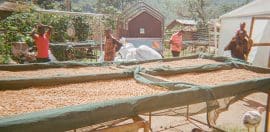Predictions for 2020: Co-ops and mutuals

5 February 2020 at 8:11 am
Coming off the back of a defining year, the cooperative and mutual sector is set to show how it can make economies stronger and communities more resilient in 2020, writes Melina Morrison, as part of a series of predictions for the coming year from experts across the social sector.
2019 was a defining year for the cooperative and mutual sector as the people-owned business model gained momentum across Australia in all industries where it operates.
Early in the year, the Financial Services Royal Commission report was released, highlighting the need for ethical business practices, corporate accountability and the importance of workplace culture. The Commonwealth Parliament passed legislation that would allow mutuals including co-op banks and credit unions to raise external capital so they can properly compete with listed companies. A further Royal Commission into Aged Care showed that the banking sector wasn’t the only area where corporate governance has failed Australians. Cooperative aged care providers emerged as a patient-focused solution offering a member-owned care model for vulnerable people.
When the catastrophic bushfires started, co-ops and mutuals sprang into action. Despite facing their own challenges dealing with a perishable product, fishing co-ops distributed free ice to stop community member’s food from spoiling and offered emergency shelter to local residents on their moored fishing vessels. Rural co-op stores left without power, took orders and supplied goods to local farmers, businesses and community members on hand written tabs. Credit unions and mutual banks unveiled financial packages to their members as soon as the fires began in their community – some as early as September and October 2019. Health mutuals provided wellbeing checks and home care for their members in regions affected by the fires, distributing care packages to displaced residents. Meanwhile other ethical, member-owned businesses worked tirelessly to help raise money to support those affected by fire. All of this was done without fanfare or publicity because caring for community is what co-ops and mutuals do.
The need for community focus as communities are rebuilt
The Australian bushfire crisis will be felt in impacted communities for years. As the rebuilding of townships begins, co-ops will be there, maintaining their focus on serving the community. The co-op model has a lot to offer to impacted communities that have come together to weather the emergency and now need to rebuild their physical assets and economies in a manner that strengthens the social fabric.
Aged care and disability care
Australia continues to face a shortage of carers and we know that families, communities and government are looking for different care models to ensure that patients and carers are treated properly.
Following the Royal Commission into Aged Care, disability services also came under the spotlight. Despite the National Disability Insurance Scheme (NDIS) coming under fire that payments are not enough to support viable care businesses, successful co-ops are showing how – with a focus on service and member ownership the sector is viable. Having been in operation for a few years, these member-owned models reported that staff members and patients were satisfied with the care and the work they were doing and their workforces are growing.
Aged care workers within the employee-owned co-operative model are able to take ownership of service quality and still draw a fair wage. This will be essential in attracting and keeping workers in this key sector going forward.
Policy makers are enthusiastic in their support for cooperative and mutual alternatives
Our sector continues to enjoy bipartisan support across Parliament with both sides recognising the economic and social value of member-owned business models to deliver locally-owned, quality services to communities.
With the farming sector experiencing ongoing hardships with retailer competition, farmgate prices, drought and then the bushfires, government is working with BCCM to ensure more farmers have access to the tools and information they need to co-operate and to work together to get a better deal.
Addressing the trust deficit
2020 represents the dawning of a new era of impact measurement for member-owned businesses with the global launch of a framework for capturing and reporting on the total value creation of cooperatives and mutuals. The Business Council of Co-operatives and Mutuals was behind ground-breaking research by accounting academics from Monash University titled Mutual Value Measurement that resulted in an industry inspired mutual accounting system designed especially for co-ops and mutuals.
Coming at the right time when customers and consumers are clamouring for reliable information about the social impact of corporations on their communities, co-ops and mutuals have a unique opportunity to show how much positive value they create beyond the usual measurements of financial performance and profitability.
Our role
The Business Council of Co-operatives and Mutuals was delighted when mutual capital raising legislation passed last year. It was a terrific reward for five years of advocacy work, but more importantly it showed that government values and understands the relevance of the cooperative and mutual business model, especially in today’s climate.
Of course, there is still much more work to do and we will continue to raise the profile of and advocate for our sector among policymakers and the community. Cooperative businesses have demonstrated that they are the stewards of community spirit in business. They help to make economies stronger and communities more resilient. Through government enquiries, and the test of crises, BCCM members have served their communities with integrity. I extend my gratitude to our existing members and a warm welcome to members joining us in 2020. We are changing the world cooperatively.
See also:







